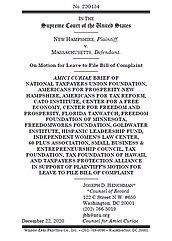Learn more about Cato’s Amicus Briefs Program.
Tens of millions of Americans have been telecommuting regularly this year for the first time ever. Next April, many of those Americans will be surprised to learn something that tax professionals generally understand: if you work somewhere for more than a few days, you will owe income tax in that jurisdiction. Massachusetts has purportedly come up with a solution to this problem: abruptly expanding the scope of its income tax to cover people who used to commute to Massachusetts but currently work in another state due to the pandemic.
Unfortunately for Massachusetts, its new rules violate well-established Supreme Court precedents on the limits of state taxation. That has resulted in somewhat rare phenomenon of a suit between states: New Hampshire is suing Massachusetts for essentially violating its sovereignty by taxing New Hampshirites as if they were Bay Staters. Under the Constitution, suits between states are filed in the Supreme Court, and the Cato Institute and several other amici have joined the National Taxpayers Union Foundation on a brief urging the Court to hear the case and vindicate New Hampshire’s sovereignty.
Massachusetts cites the pandemic emergency as the justification for a new rule that is so sweeping in its scope that it would allow state taxes to be imposed on former Massachusetts commuters wherever they may be in the world today. Since the pandemic, approximately 123,000 New Hampshire residents have stopped commuting to Massachusetts for work. Massachusetts argues that, because they once worked in the state, they can tax 100 percent of their income even though 0 percent of it was earned while being physically in Massachusetts. Moreover, the state seems to believe it can tax these workers indefinitely, which is certainly not true. In short, Massachusetts’s action expands the taxation of non-residents beyond what is constitutionally permissible.
The abrupt change in policy by Massachusetts is a power grab that harms taxpayers and intrudes on the sovereign powers of New Hampshire. Suits like this one are precisely the type of interstate dispute the Supreme Court was partially created to adjudicate. The Court should take the case and clarify that states cannot casually assert indefinite jurisdiction to tax non-residents.

This work is licensed under a Creative Commons Attribution-NonCommercial-ShareAlike 4.0 International License.


